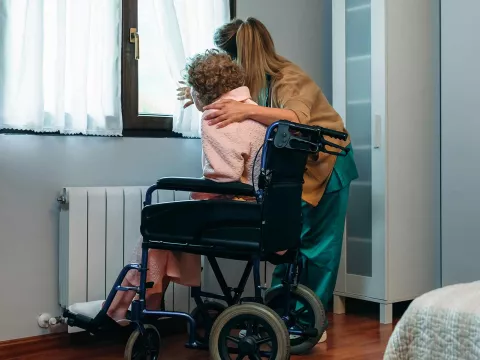- AdventHealth

As your family member or loved one grows older, you treasure each moment spent with them. When the time is right for hospice care, you want to find compassionate people to help your loved one cope with illness and feel safe and comfortable.
Likewise, you — and each member of your family — deserve the support of a whole team of people to guide you through this challenging time.
Hospice care is not merely a service that helps you and your loved one make the most of your time together. It also offers emotional and spiritual healing for the whole family.
Having a hospice care team means your family can lean on the deep compassion and endless support of a group of specialists who will guide you through this journey.
Meet Your Hospice Care Team
As you prepare to help your loved one transition into hospice care, take comfort in knowing that your family will be supported every step of the way.
Your hospice care team is made up of health care experts and compassionate people who can help your loved one feel whole physically, mentally and spiritually.
Each person on your hospice team — from doctors to hospice staff to trained volunteers — will work with your family to ensure you are always the leading voice in your loved one’s hospice experience.
Your Loved One’s Primary Caregiver
You may be your loved one’s primary caregiver, or it may be another family member, a loyal friend or a hired caregiver. This person provides necessary daily care to your loved one with the support of the entire hospice care team.
Your Physician
Your doctor has been there with your loved one every step of the way. He or she may continue to do so throughout hospice care, if you so choose. Your loved one’s physician is already intimately familiar with their medical history, which helps them care for your loved one during hospice, too.
Hospice Physicians
Hospice physicians are the compassionate people who coordinate your loved one’s care plan. These doctors work closely with other hospice team members and your loved one’s physician to manage physical symptoms with care.
Hospice Nurses
Hospice nurses coordinate your loved one’s care plan with the physician and the rest of the hospice team. They manage symptoms and pain to ensure that your loved one is as comfortable as possible.
Your hospice nurse can also educate your family members on the use of medical supplies and equipment, along with how to properly administer medications.
Home Health Aides
If your loved one is seriously ill, even a simple task can become challenging. Home health aides fill an important role by providing personal, in-home care to your loved one. Your aide may help with bathing, grooming, preparing light meals, changing bed linens and bandage changes.
Chaplains
Spiritual caregivers are key parts of your hospice care team and support the traditions and beliefs of all cultures and religions. Your chaplain can discuss spiritual matters, answer questions, pray with you or help meet religious or spiritual obligations. If needed, they can also assist with funeral plans and services.
Social Workers
Depending on your loved one’s needs and concerns, they may want to talk about their priorities, may need help resolving a family conflict or may need help understanding their illness or health condition.
A social worker can help your loved one in each of these areas, as well as help complete advance directives, connect families to community resources and provide emotional support and counseling.
Trained Volunteers
Specially trained volunteers complete many needs and tasks that make your day just a little bit easier. They can run errands, do light housekeeping, provide companionship and play cards or read a book to your loved one. If necessary, volunteers can stay with your loved one, allowing you to take a breather before returning to your loved one’s care.
Bereavement Counselors
When you or another family member needs guidance in navigating grief, even before the loss of a loved one, bereavement counselors are here to help.
Important members of your hospice care team, bereavement counselors are available during hospice care and beyond, providing individual and group grief support to your entire family.
Focusing on the Beauty of the Journey
The goal of hospice care is to make the transition through the final stages of a health condition more comfortable and peaceful for your loved one — and the whole family.
Losing a loved one to a life-limiting illness is difficult for everyone involved. Working as a team with hospice can help comfort your family and allow your loved one to have the peace and dignity they deserve during their most difficult days.
Hospice Care You Can Count On
While your family member or loved one is in hospice, we want you to be able to focus on your loved one and know that you can rely on your AdventHealth hospice team to help with the rest.
Learn more about when to begin hospice care, the different types of support available to you, volunteer services and whole-person care for your entire family at AdventHealth.



